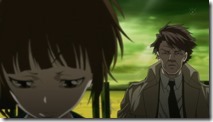 |
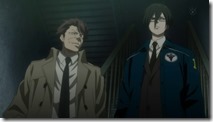 |
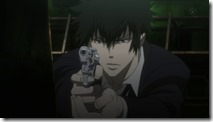 |
Just because you know something is coming doesn’t mean it can’t have an emotional impact. That pretty much sums up this episode of Psycho-Pass, and doesn’t do a bad job of summing up everything its author has written.
Urobuchi Gen is a purposeful writer. That can be a powerful thing, and it has implications that are both positive and negative. It seems as if everything in a Gen script is there for a specific purpose – including the characters. He starts out with an agenda, a point he’s trying to make, and everything that comes afterwards is a cog in a well-oiled machine. It almost always yields entertaining and (because Gen is a pretty smart guy) thought-provoking results. But for me, there’s always something missing. It’s the difference between an efficiently mass-produced and well-designed product made by a clever automated process, and something hand-made. There’s some element of soul that I simply don’t feel from Gen anime – as if there’s an extra layer of remove between the author and the audience.
I’m trying to remember the last time something in a Gen series surprised me – really, truly surprised me. It certainly hasn’t come in Psycho-Pass, and not in Fate/Zero either. The ending of Madoka Magica was classic Gen too, as was the juxtaposition of gruesome brutality and cute character designs that defined the early part of the series. In a way Psycho-Pass is probably the world that best suits Gen’s style – gritty, cynical, deeply rooted in the ways of tried-and-true formula. But it’s almost too easy for him, I think – while its flaws were more serious, in Madoka at least we had the novelty of Gen’s ruthless sensibility being superimposed on a genre that was superficially a strange choice for it. Because the guard-rails of a show like P-P are so well established and the influences so transparent, we can keenly feel the fact that Gen ultimately isn’t about twisting and re-thinking genre cliches the way someone like Togashi is – he simply wants to execute them in a slick way while asking larger questions he never tries very hard to answer.
What’s undeniable is that Gen is like a locomotive – once it becomes clear where a series is headed nothing is going to stop it, and a runaway train most certainly makes an impression. Everyone is following their proper path. When Kagari set the death flags, he died. Kougami looks at a blade of grass and deduces the villain’s entire plan from it, as well as their brand of toothpaste. Akane looks adorable and wrestles with her conscience. And this week, it was Gino and Masaoka’s turn to fulfil their assigned tasks. As the clearly defined B-characters and B-relationship in the series, their story was required to conclude in the penultimate episode. Because he’s set so many death flags, Masaoka was assigned to die. And because of the nature of their relationship, he had to do it in protecting his son, with whom he would have a deathbed reconciliation. Check.
Of course knowing this was going to happen doesn’t mean it doesn’t work to some extent dramatically, and indeed it was nicely handled (stuff in this series usually is). Kougami, Akane and Masaoka (even Gino) may be archetypes, but like most Gen archetypes they’re good versions. Masaoka especially was the one character in the cast who struck an emotional chord with me although we’ve seen him a hundred times already, and his relationship with Gino (the truth of which was clear long before Gen chose to disclose it officially) the most interesting interpersonal connection in the series. I knew Masaoka was going to die, but I still hated to see it happen. It followed the script – he not only gave his own life for Gino (who caused the crisis with his own incompetence, as usual) but let Makishima escape in the process. Ultimately, as the rules dictated, he chose fatherhood over being a detective – and it seems clear now that Gino will end up following in his footsteps as this incident finally pushes him over the edge into Enforcer territory (having him lose the same arm as his father was laying it on a little thick, even for Gen).
So why, one might ask, did Kougami miss Makishima when he had a clear shot at him at close range (actually two) – and why did Makishima allow himself to be caught unawares in the first place? Better not to ask I guess – maybe it was Kougami’s lack of practice with handguns (that explanation works as well as anything else). All that matters is that Gen got his chess pieces where he needed them – Gino and Masaoka are dealt with, Yayoi is safely shoved to the side, and Kou and Makishima are in a good old-fashioned back-alley knife fight with Akane screaming towards them trying to have it both ways as usual. The symbolism here is not subtle – like the proverbial nations who start out fighting with nukes and end up using bows and arrows, Kougami and Makishima have cast aside the tools of technology to settle things with their hands and a few inches of steel. I find myself rather hoping Akane doesn’t show up in time to spoil the fun, but the rules seemingly require that she have her GAR-moe moment be the crescendo of the series’ plot. We’ll see.
The most interesting thing happening in Psycho-Pass is no doubt the opportunity it provides to see Gen musing aloud on the state of modern society, and Japan in specific. He always gives Makishima the most interesting things to say (I speculated many weeks ago that he seemed to be Gen’s proxy in the series) and this week, the subject is isolation. Kougami’s 5-cent psychoanalysis (courtesy of Saiga-sensei) of Makishima might not be entirely off the mark, but I think Shougo-kun’s larger point is closer to Gen’s true feelings – the issue here is that modern society has obsoleted the community, and everyone is alone. It certainly applies to the cast of this series – Akane is every bit the singular oddity that Makishima is, and Kougami exemplifies the “lone wolf” model to a T. How does it all end up, then? Gen’s history suggests an ending that requires someone to martyr themselves to the greater cause (if Gen is not a Christian himself, he’s clearly obsessed with Christian allegory at the very least) and a conclusion that provides transition, but doesn’t leave anyone truly happy. With all the supporting players having fulfilled their assigned tasks, he’s now free to make that happen using the three characters that really matter to the story.
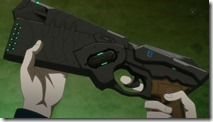 |
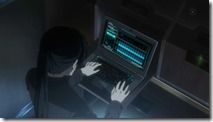 |
 |
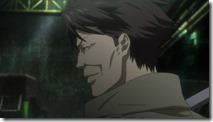 |
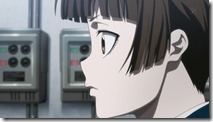 |
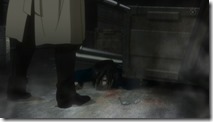 |
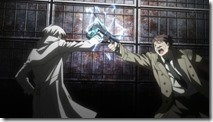 |
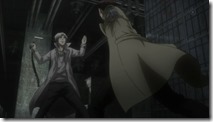 |
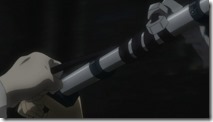 |
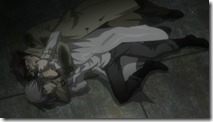 |
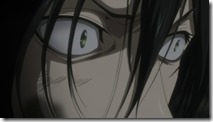 |
 |
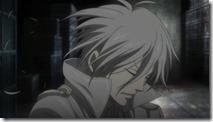 |
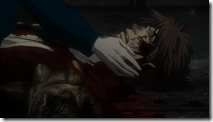 |
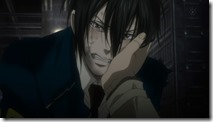 |
 |
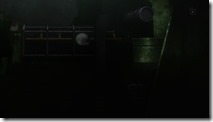 |
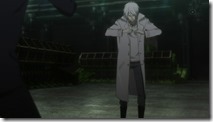 |


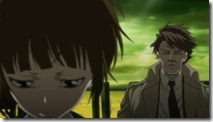
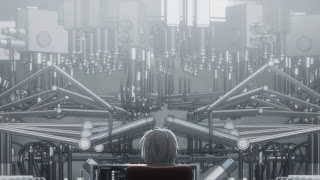
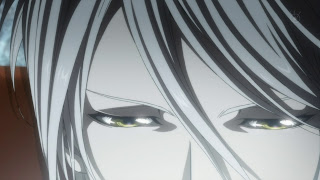
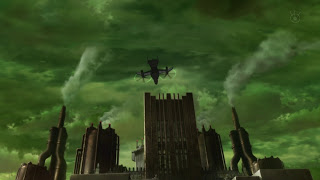
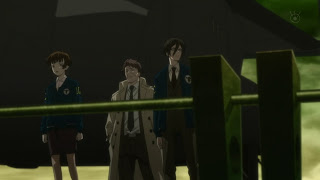
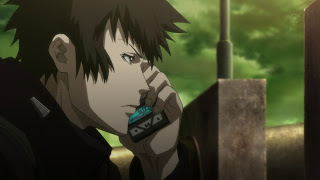
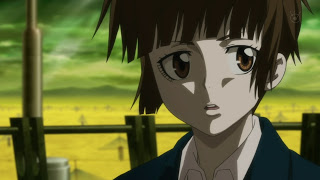
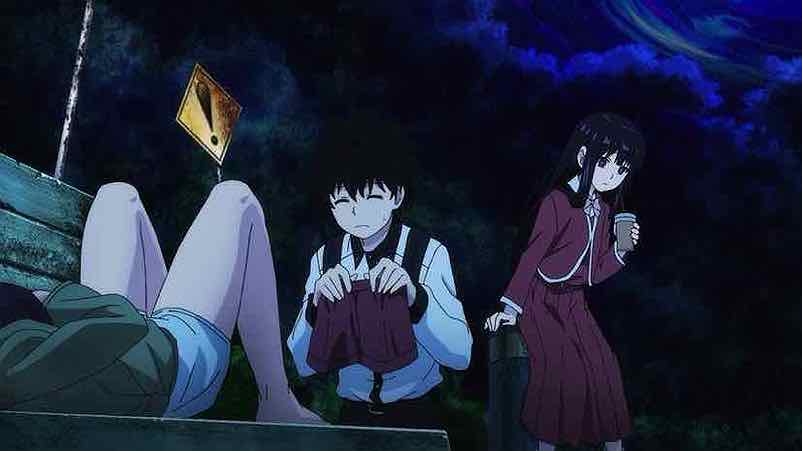
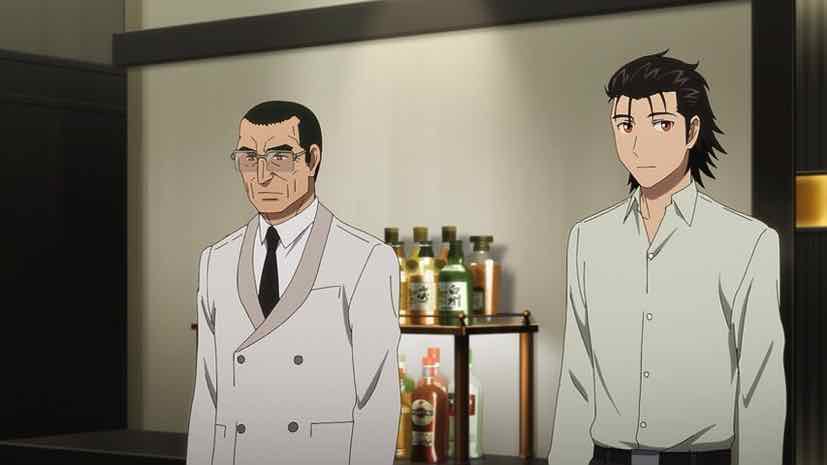
Awet M
March 16, 2013 at 4:44 amSolid analysis.
Gen Urobuchi may only be scratching the surface of his talent. Kind of like a video game player with over-developed eye-to-hand coordination trying out a new game for the first time. He's not gonna go full-bore right away, just stick to the basics until he gets the intuitive gameplay down pat before he tries more challenging moves and takes on challenging bosses.
Eh.
But I enjoyed this episode, even if it was by-the-Urobuchi-numbers. There's something to be said for a satisfying resolution to well-established archetypes in a well-executed performance.
However, I do hope for a surprise ending, where Akane actually kills Makishima and joins the Sybil system or something like that, forcing Kougami to reconsider his brand of justice.
admin
March 16, 2013 at 5:19 amKind of like first-season Chihaya?
Awet M
March 16, 2013 at 6:55 amI am sorry, but I don't quite follow your analogy…?
First season Chihayafuru was great, but there was no resolution. It felt more like a terrific first season missing a denouement, which practically forced the audience to beg for more.
P-P OTOH is heading towards one – hopefully a surprising one, or at least a classic grimdark ending straight out of the pages of Shakespeare.
admin
March 16, 2013 at 8:10 amSorry, I meant your description of Gen as a writer sounded a lot like the way Chihaya played Karuta in the first season (though that might be giving him too much credit).
Ronbb
March 16, 2013 at 6:35 amWe have one episode left, but I can say that PP is my least favourite show from Gen — probably I am more trained to his formula now. I still enjoy his work — they are well-written, thrilling, and highly intellectual posing intriguing questions to society in general. However, it's hard to form a bond with the characters. Akane, for example (and I am about to be shot by her fans…lol), I personally find her growth to become a full-blown detective who thinks like Kougami out-of-pace, but she needs to play that role as that's what the plot requires her to… This makes me like her less, or to be honest, I can't find myself to like her and worry about her. Yayoi, for another example, is back to her role of playing with her laptop even after that one episode of flashback — which I still don't understand why we need that… That's why as entertaining as PP is, I prefer R;N way more.
Having said that, Masaoka's passing away is heart-wrenching for me. He's the only character who is real and has depth. The moment when he placed his hand on Gino's face and told him that he's his son after all, I was hoping that Gino could call Masaoka dad before his last breath… Of course, Gen wouldn't give us that, but at least Masaoka was with his beloved son touching his face and calling him son before dying with a smiling face. I guess I should be thankful because this is a bonus in Gen's standard.
Awet M
March 16, 2013 at 6:51 amYes, Madoka and Fate Zero were probably superior products, likely because they were more ambitious (Madoka and the Magical Girl genre, F/Z and the truth of nihilism) but PSYCHO-PASS is not far behind.
Zeta Zero
March 22, 2013 at 2:14 pmNo you've got it all wrong. Fate/Zero is the worst. Its execution was so hackneyed as to ruin any potential it might have had. The best parts of that series were arguably the Kayneth El-Melloi Archibald/Diarmuid Ua Duibhne portions, and the series really lost steam after that.
What I am most pleased about is the fact that a show like this is even attempted in this day and age. It's a welcome break from Japan's usual infatuation with moe and sentimental high-school dramas.
Son Gohan
March 16, 2013 at 8:51 amOriginality is overrated. I'd take good execution over originality any day of the week. And Gen thankfully delivers in that department.
foon
March 17, 2013 at 7:45 pmIndeed – tropes exist because they work.
selma
March 17, 2013 at 12:46 amwhen i watched fate zero i didn't know that the writer was urobuchi gen and i had never watched any of his shows and fate zero was really a revelation for me, I didn't think that it was missing something, on the contrary it privided something that was missing in all the other great shows i watched. all along I kept thinking : what an amazing writing. I'm glad i didn't have all these assuptions about urobuchi because they seem to be marring many people's experience of his shows.
psycho pass is different from fate/zero but equally thrilling if only everyone would stop the systematic comparisons
Scruffy
March 17, 2013 at 11:20 pmI recently started re-watching PP and I realised just how much better these later episodes are. The first few episodes are particularly clumsy in how they explain the world and the rules around it. However it is really interesting to see how much Akane has changed.
I have a nasty suspicion that Akane is going to chose to keep the Psycho Pass system by joining it .. being inside the tent pissing out. It would be kinda creepy to see a tender moment with Kougami and Akane with her in the chief's cyborg body!
Thatguy3331
March 18, 2013 at 12:05 amSolid analysis.
the momment I saw the screen Icon of Masoka fighting makishima when I was about to watch it on Funi's sight, I told myself "He's gonna die" but seeing it still sucked.
I left the episode with a sense of both satisfaction and the desire to listen to that gag song "knife fight"*Commence the memes!*
Chin
March 19, 2013 at 11:30 pmI think Sibyl will remain as is. If Makishima is caught by Akane he would join the system because that is their condition per se. But I still like this series despite its flaws and all – I find it rather enjoyable and intellectually stimulating.